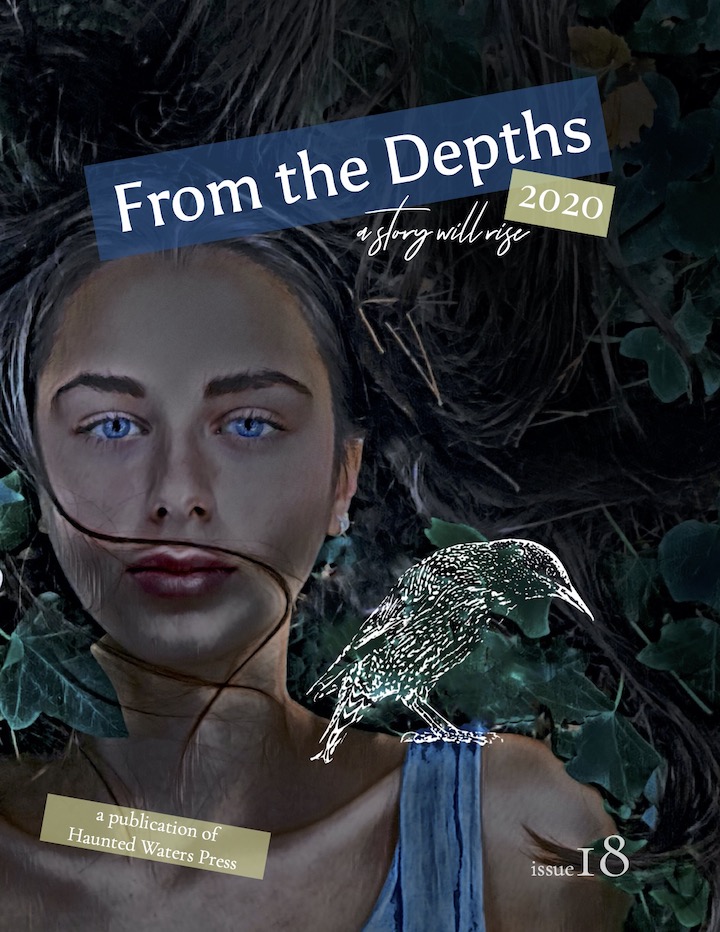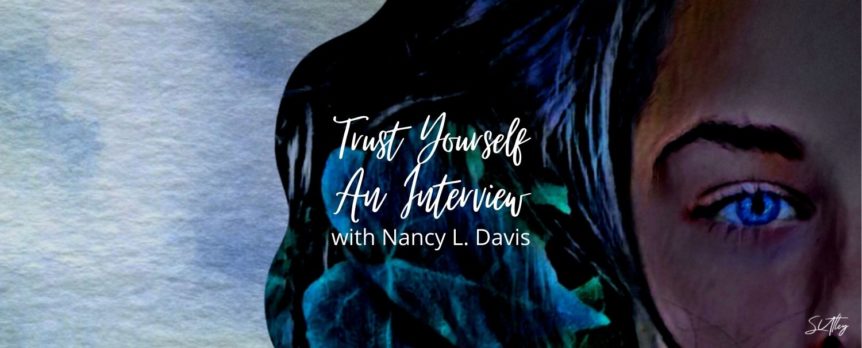Greetings! We are so pleased to share our interview with Haunted Waters Press Contributor Nancy L. Davis. Nancy's poem Asphodel Fields is featured in the 2020 issue of From the Depths. You can also find her short story Effluence within the pages of SPLASH! Enjoy!
I am one of those people who started writing at a very early age, be it plays, stories or poems. Like so many, Edgar Allan Poe's Annabel Lee caught my attention in Middle School English class, as did Dylan Thomas's Do Not Go Gently Into That Good Night. In part, I think it was the musicality of those poems that spoke to me. I am a big fan of sound imagery and rhythm in my poems. Later, William Stafford's Traveling through the Dark made an indelible impression on me because in it his technique perfectly upholds the voice and tone of the poem. The experience is simultaneously beautiful and heartbreaking.
How long did it take you to find your voice in your poetry? Do you look back on your early writing and see the ways in which you have grown as a writer?
My poetic voice is still evolving. As an undergraduate English Major, for my Senior Thesis, I juried to work on a book-length manuscript of poems, complete with a 15-page critical Introduction. The process spanned eight months of immersing myself in the reading of contemporary poets (I had read the Classic, Romantic, and Modern Poets extensively in my academic courses) and writing drafts each week for my Advisor to painstakingly critique each one, often line by line. That process established the discipline. It was a glorious way to spend my Senior year, and I knew then that writing would be integral to my life. But I did reach a point the following year where I became interested in character, and that's when I started to explore short fiction writing. A couple years later, I won a Fellowship in Fiction Writing at the University of Massachusetts, Amherst. My fiction writing was always lyrical, an influence of my poetry writing. When I began again to write poetry in earnest, years later (largely as a result of teaching poetry and poetry writing to college students) my poems began to take on a storytelling quality. Today, I write both poetry and fiction; the two genres definitely inform each other.
Be attuned to your surroundings; be alive to the music of poetry.
—Nancy L. Davis
We’d love to know more about your process for writing poetry. Do you sit down to write on a schedule, or rush for a pen and paper when an idea strikes?
That really depends on what stage of my professional life you are referencing. When I worked a "9-5," I was very disciplined, rising each morning at 5:30 to write before heading to work. In those days, I was writing short fiction, which lent itself to a daily routine. Once I began more demanding jobs—writing and producing educational films, for instance—I stuck to the routine as much as possible, filling the weekend days with writing if the workdays were too long and demanding. Once I began teaching college full-time, I had little time or energy to write during the academic year, but I took summers off to spend time with our daughter and to write. Of course, immersing oneself in the teaching and reading of vast amounts and types of literature absolutely positively affects one's writing. I also took a one-year Sabbatical to revise my short fiction collection and work on new pieces. The first year I retired from teaching, the writing poured out. For poetry writing, it depends: if I am working on a chapbook or book manuscript, I write consistently--maybe not every day, but every week. I always have ideas floating in my head and written in my notebook. Often with poetry, the idea has to gestate until I feel primed to write. Sometimes, the work requires research, which can also create the impetus to write the first draft. Dreams can work their way into poems (and stories); sometimes I will relegate a poem by thinking of a controlling image for the subject. Other times, an emotional experience or something riveting in the news will spark a poem. So poetry writing is more eccentric. However, I did participate in the Tupelo Press 30/30 Project in June 2020, where we wrote a poem a day to raise funds for the Press. That was a terrific experience and allowed me to push new boundaries.
Do you find your poetry driven more by truth or fiction? How much personal experience makes its way into your writing?
Both. Some of my poems are deeply personal without being uncomfortably so. Others are driven by environmental or political injustice. Still, others are insights I gain through being immersed in the natural world or urban world.
What advice do you have for the self-conscious aspiring poet?
Read, read, read. Attend poetry readings (now offered on Zoom); read at Open Mics, join a workshop, read your poems aloud to listen for "false" notes. Keep a notebook of ideas or phrases, images that pop up. I often start writing poems by hand then move to the computer where I can better shape them. As a beginning poet, do try to write regularly, whatever that means for you. We all have daily challenges, and we shouldn't feel guilty if we can't write every day. Just make it a mental and emotional habit. Be attuned to your surroundings; be alive to the music of poetry. Think beyond the obvious. Play with language.
Writing is already a fairly solitary endeavor. How would you say the pandemic has affected you as a writer?
The pandemic has actually helped me as a writer. I've said to friends that we writers are fortunate in the sense that we can still practice our craft during this time. Performance artists face more challenges, though many have overcome those challenges in creative ways. Like many writers, I first began writing about the pandemic experience. I published a poem called
When you’re not writing poetry, what might we find you doing?
I love the outdoors--hiking, kayaking, swimming, biking, gardening, birding. I live for cultural events and museums of all types and cannot wait to travel again, both in the states and abroad. Of course, I'm an avid reader, so you will often find me with book or journal in hand or earbuds in place as I listen to an Audible favorite.
What are you reading right now?
About a dozen things! On Audible, I'm listening to a newer translation of Dante's The Divine Comedy. I listen as I power walk; the rhythm of his tercets and the exquisite language feed my poetic soul. I'm in and out of a half dozen poetry texts, including Seamus Heaney, Elizabeth Bishop, Mary Oliver, and Louise Gluck, as well as Four Quartets, Tupelo Press, an anthology of pandemic poems. I recently finished Baracoon, by Zora Neale Hurston, a firsthand account of Cudjo, the last living survivor of the Middle Passage. I'm also reading My Life As An Animal, by Laurie Stone.
What words do you live by? Do you have a personal motto?
"Just trust yourself. Then you will know how to live." ~Goethe
If you could tell your younger writing self anything, what would it be?
Trust yourself!


Lightning Round with Nancy L. Davis

ABOUT THE AUTHOR
Nancy L. Davis has published fiction and poetry in Route Nine, Cutthroat, 15th Anniversary Edition: Best of Philadelphia Stories, an anthology, From the Depths, and The Dewdrop, to name a few. She earned her MFA from the University of Massachusetts/Amherst and recently retired as Associate Professor of English at Harper College. Awards include a Pushcart Prize Nomination in Poetry, First Place in the Sandy Crimmins National Poetry Prize, and Finalist in the Joy Harjo Poetry Prize. Finishing Line Press published Ghosts, her poetry chapbook, July 2019. Currently, she lives in Park Ridge, IL, and Long Beach, IN, on Lake Michigan.
Share this Post

